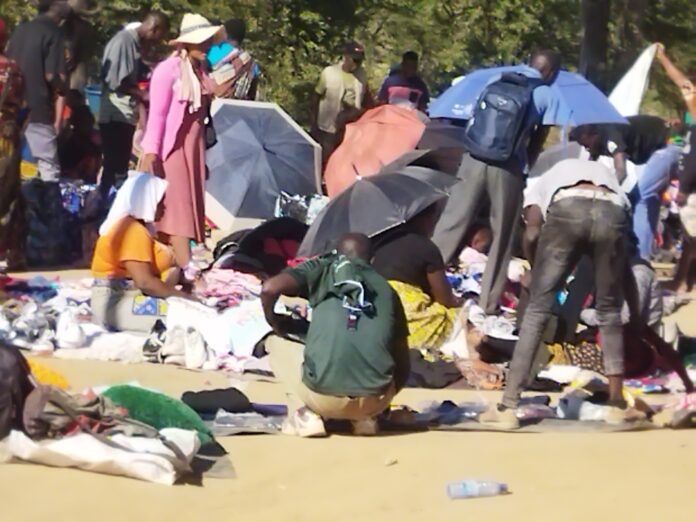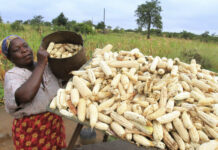
Sydney Kawadza
The number of people arrested for violating COVID-19 regulations in Zimbabwe is galloping towards the one million mark with complacency taking root in many communities despite rising cases and deaths due to the deadly virus.
Skepticism and reluctance by the general public has led to health experts expressing concern over the people’s behavior that has forced authorities into a corner.
According to statistics from the Zimbabwe Republic Police national spokesperson Assistant Commissioner Paul Nyathi close to 800 000 people had been arrested for various crimes associated with breaking the regulations.
Government has imposed a nationwide lockdown since the first COVID-19 case was recorded in Victoria Falls in March 2020 although the restrictions have been reviewed regularly.
Zimbabwe is currently on a Level 4 COVID-19 National Lockdown with reduced business hours running between 8am to 3pm while a 6pm to 6:30am curfew has also been ordered by authorities.
Businesses have been ordered to reduce their workforce to 40 percent.
Authorities have also banned inter-city travel as cases continue to rise.
However, government efforts to curtail the spread of the virus are in jeopardy as it faces a huge case load and rising numbers of casualties.
According to the Ministry of Health and Child Care, Zimbabwe has had 56 014 cumulative cases since March last year.
The virus has claimed 1 911 lives since it was first discovered in Zimbabwe.
Nyathi said: “The total number of people arrested for violating COVID-19 regulations throughout the country since March 2020 is 765 601.”
According to investigations conducted by The Anchor, most people follow the COVID-19 regulations when they are in urban centres.
All caution is, however, thrown to the wind as soon as people are out of monitored areas especially the Central Business Districts.
Sporadic raids by the police in residential areas are also proving to be ineffective.
Observations during the investigation also indicated that enforcement of the COVID-19 was not evident in most areas along the Beitbridge-Harare-Chirundu Highway.
Of note were the monthly market days held in most rural areas.
These draw thousands of villagers at business centres.
In Chivi District, Masvingo Province, thousands of villagers were gathered at Maringire Business Centre recently to buy and sell various goods without taking any precautions.
A few people wore masks properly, no social distance was being practiced and hand washing or sanitizing was virtually non-existent.
“We hear of these regulations but who will be enforcing them. Most of these villagers really struggle when they go to urban centres because the police will arrest them,” John Chikumba, a villager who was selling second-hand clothes said.
Several villagers who sell fruits, drinks and an assortment of vegetables along the highway were also skeptical about the dangers of the virus.
At Mapinga Business Centre, Mashonaland West province, about 60km from Harare, along the same highway, scores of women spend the day chasing after cars and heavy trucks while trying to sell roasted maize and apples.
“We know the dangers of the virus but we have not seen any one among us contracting the disease. We become ill from common colds but no-one has contracted the Coronavirus,” Mary Chakuchichi, a vendor at the Mutorashanga turn-off said during an interview.
In Karoi, one of the current COVID-19 hotspot where government has imposed a strict lockdown, more people have been attracted to the town due to the ongoing tobacco selling season.
The town has about 15 tobacco auction floors which have attracted people from across Zimbabwe.
Before the strict lockdown, Karoi had become a hive of activities during the night with alcohol flowing till the wee hours of the morning.
“We know there is COVID-19 but there is no need to worry when you have not contracted the virus. Most people here include ladies who are trying to earn a living and this is the right time to make money,” a woman who was selling alcohol from a cooler box declared.
In Chirundu, at the Zimbabwean border with Zambia, citizens of both countries cross the border whenever they have an opportunity.
Zimbabweans travel to Zambia for groceries as the town across the Zambezi has chain stores that are not found in Zimbabwe.
“We do not have supermarkets on the Zimbabwean side so you can go to Zambia to buy meat or cooking oil with ease. The Zambian products are even cheaper across the border,” a Janet Mvurayehore said in an interview.
Zambians also cross the border to sell second hand clothes that have a ready market in Zimbabwe.
Commenting on the skepticism and complacency among citizens, health expert and Bulawayo’s Mpilo Central Hospital chief executive Professor Solwayo Ngwenya said the sociable manner of people in Southern Africa could lead to disastrous consequences.
“Unfortunately, our people do not want to follow any guidelines no matter what the circumstances are. There is always a tendency for illegal behavior by the people.
“The citizens across Southern Africa also normalize illegalities and that is why authorities are finding it very difficult to impose the laid down guidelines and regulations.
“People should be taking heed of the restrictions, rules and regulations. Unfortunately, they are very sociable and people enjoy socializing to the extent of not practicing social distancing.”
Professor Ngwenya said authorities were in a quandary as people cannot apply some of the regulations at a personal level.
“The people’s behavior is quite detrimental to government’s efforts to curb the spread of the coronavirus,” he said.
The respected medical doctor said skepticism had brought a lot of complacency and dismissive behavior which was working in favour of the coronavirus.
Zimbabwe is currently grappling the Third Wave of the COVID-19 pandemic with authorities pushing for the vaccination of the people against the virus.
More than 700 00 people have received the first dose of the vaccine while at least 550 000 have had their second jabs.
- This project was funded by the National Geographic Society


















